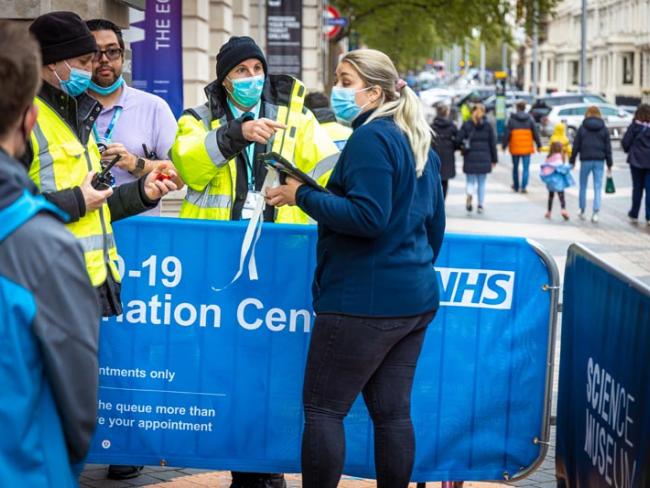
Vaccination centre, South Kensington, London, 2021. Alexey Fedorenko/Shutterstock.
Britain’s coronavirus vaccine taskforce was successful, but government has thwarted its aim for future resilience…
The long shot: the inside story of the race to vaccinate Britain, by Kate Bingham & Tim Hames, hardback, 326 pages, ISBN 978-0861545643, Oneworld Publications, 2022, £18.99. Kindle and eBook editions available.
This is the story of how public and private sector bodies worked together to produce the vaccines that saved so many lives. A vaccine was “the only reliable long-term route by which Britain and the wider world could be saved from the horrors of deaths and lockdowns.” But as the authors say, “no vaccine had ever been successfully developed to combat any human coronavirus. Ever.”
On 6 May, Boris Johnson told Kate Bingham that the Vaccine Taskforce (VTF) she was to lead had three objectives – to secure vaccines for the UK, to ensure vaccines would be distributed equitably around the world, and to make the UK more resilient for the next time.
Bingham writes of this second goal, “This was immensely important to me, not just because it had been made a VTF goal. Morally and practically, I could not see how we could truly bring the Covid-19 crisis to an end and be confident that it would not flare up again later without a genuinely global vaccine campaign.”
Bingham says there was far too much “vaccine nationalism”. For example, the USA’s Food and Drug Administration suspended an AstraZeneca trial for two months after an adverse reaction was suspected in one participant. When a US company’s trial had the same experience, the FDA suspended its trial for just one week.
France’s President Macron suggested that the vaccine did not work on the elderly. German Chancellor Merkel agreed, saying that she wouldn’t take the AstraZeneca vaccine. As the authors note, “Not content with claiming that the vaccine didn’t work, the EU leaders then alleged breach of contract in early 2021 and sued AstraZeneca for non-delivery of the vaccine.”
“Consistency didn’t seem to trouble the EU. The consequence was that 1.4 million doses were left unused in Germany when thousands of people were dying in early 2021… There is no doubt that politically motivated and ignorant comments, amplified by hysterical headlines in the media, slowed the vaccine roll-out on the continent and cost lives.”
On 9 November 2020, BioNTech and Pfizer announced that their vaccine was more than 95 per cent effective. 43,000 people in six countries had taken part in their Phase 3 trial, so this was a stunning and unambiguous result. It took 266 days from the moment that the Pfizer CEO had taken on the task of finding the vaccine to its first approved injection.
By 1 March 2021, Britain had vaccinated 35 per cent of its adults, including nearly all in the most vulnerable groups, while the EU was stuck on 7 per cent and struggling for supplies because it had not placed orders in time. By June, 82 per cent of British adults had received one dose, and 60 per cent had received two doses.
Sir Jeremy Farrar, Director of the Wellcome Trust, had strongly favoured a pan-European vaccine policy, but later graciously wrote, “While I was initially disappointed that the UK had opted out of the European Union procurement scheme, the UK’s Vaccine Taskforce [VTF], led by Kate Bingham, has been one of the standout successes of the country’s pandemic response. While I don’t like saying it, it was the best possible example of British exceptionalism approaching a challenge with a mixture of urgency, risk-taking and pragmatism...”
By the end of 2021, AstraZeneca produced the most doses globally of any vaccine. It supplied two billion doses to 178 countries within a year of first approval. It was sold on a non-profit basis, so it was given to those who needed it around the world.
Contracts
In July 2022 The Economist noted that “Covid vaccines saved around 20 million lives in their first year…those produced by AstraZeneca-Oxford and Pfizer BioNTech…accounted for more than half the lives saved by vaccines.” Bingham notes, “These were the first two contracts we signed for the UK.”
“It was the best example of approaching a challenge with a mixture of urgency, risk-taking and pragmatism...”
The arrival of the Omicron variant did not make the vaccines ineffective. In early 2022, society was reopened and infection rates soared; the number of deaths did not escalate similarly.
But Bingham’s third goal – making us more resilient for the next pandemic – was not achieved. The VTF had planned an advertising campaign to support a large-scale push for people to sign up to the NHS Covid19 Vaccine Research Registry, through which the public could show their willingness to participate in clinical trials of vaccines. But the Cabinet Office blocked the necessary spending from the VTF’s budget.
No backing
The VTF was unable to achieve its goal to build permanent pandemic capabilities in Britain. It did not get government backing for an industry partnership to build bulk antibody manufacturing capacity, despite significant interest from several companies to build new facilities.
The VTF had invested £5 million to support training people in North East England in specialist skills needed to manufacture advanced therapies and vaccines – but that was wasted without new facilities.
As a result Britain does not have a secure supply of bulk antibodies. Without this capability, our ability to cope with future pandemics is seriously weakened.
The government has sold the Vaccine Manufacturing and Innovation Centre to the US company Catalent, as reported in Workers previously. But that facility now looks unlikely to provide the range of scaled-up manufacturing capabilities and development resources needed to explore new vaccines.
